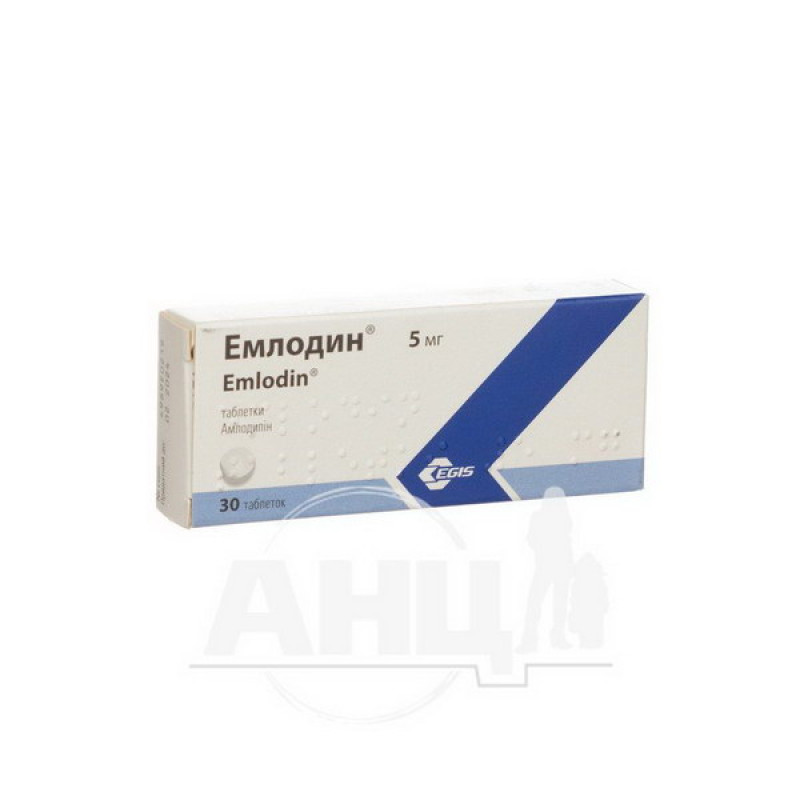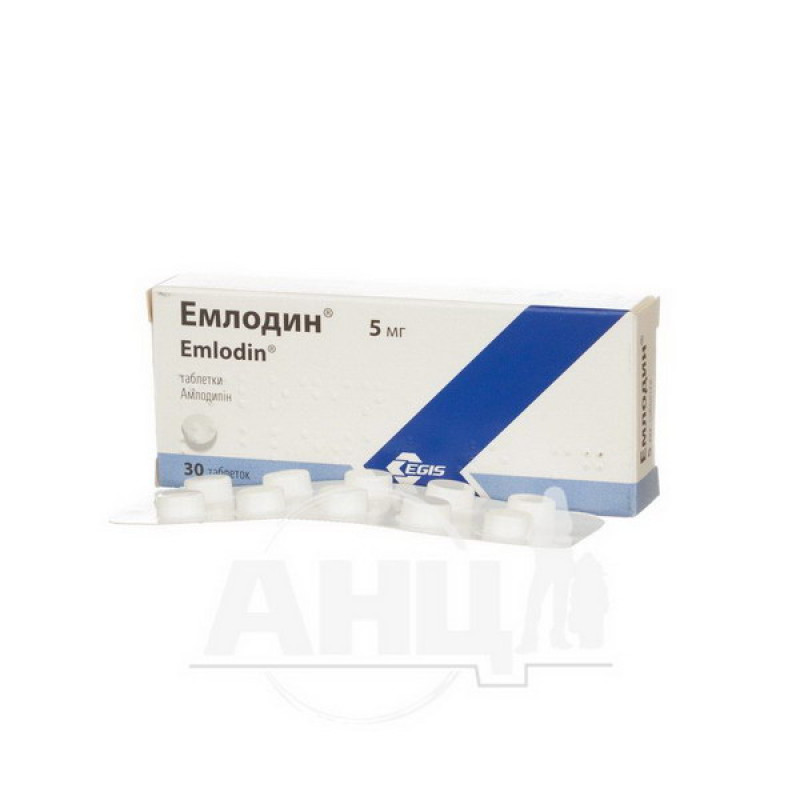Emlodine tablets 5 mg blister No. 30

Pharmacological properties
Amlodipine inhibits the transmembrane flow of calcium ions in cardiomyocytes and smooth muscles. The antihypertensive effect is due to the direct relaxing effect of amlodipine on vascular smooth muscle and a subsequent decrease in peripheral vascular resistance. In angina pectoris, amlodipine reduces ischemia both by dilating peripheral arterioles and reducing the load on the heart without changing the heart rate, which leads to a decrease in myocardial oxygen demand, and by dilating the main coronary arteries and coronary arterioles in ischemic areas of the myocardium. This leads to an increase in the supply of oxygen to the myocardium of patients. No negative effects on metabolism have been identified. The drug does not affect the level of blood plasma lipids, blood glucose and serum uric acid.
The drug is rapidly and completely absorbed from the gastrointestinal tract. Food intake does not affect the absorption of the drug. C max in blood plasma is achieved 6-12 hours after administration. Absolute bioavailability is 64-80%. Binding to plasma proteins is 93-98%. T ½ on average is 30-35 hours. Amlodipine is actively metabolized in the liver. About 60 and 20-25% of inactive metabolites are excreted in the urine and feces. 10% of the dose is excreted unchanged in the urine. Total clearance is 7 ml/min/kg (25 l/h) for patients with a body weight of 60 kg, in elderly people - 19 l/h. The pharmacokinetics of amlodipine does not change in renal failure or in elderly patients.
Indication
Antihypertensives as monotherapy or in combination with other antihypertensive drugs; stable and vasospastic angina (Prinzmetal's angina) as monotherapy or in combination with other antianginal agents.
Application
In case of angina pectoris or angina pectoris, the initial dose is usually 5 mg/day, it is advisable to always take the drug at the same time. Depending on the response to the drug, the initial dose can be increased to 10 mg/day. The dose of the drug is not changed when using thiazide diuretics, β-adrenoreceptor blockers and ACE inhibitors simultaneously.
Elderly patients, as well as those with impaired renal function, are prescribed the drug in normal doses.
The dose of Amlodipine ® should be reduced (to 2.5 mg/day) in patients with impaired liver function, since T ½ of the drug is increased in these patients.
Contraindication
Hypersensitivity to amlodipine or other ingredients of the drug; children's age (due to lack of clinical experience); unstable angina; clinically significant aortic stenosis; breastfeeding period.Side effects
Sometimes - dizziness, hot flashes, tachycardia, edema, headache, fatigue, stomach pain, drowsiness, nausea. Most often these phenomena are temporary and disappear when the drug is discontinued.
Nonspecific skin reactions, gingival hyperplasia, dyspepsia, asthenia, joint pain, muscle pain, muscle spasms, sexual dysfunction, dyspnea, itching, pollakiuria may occur.
In rare cases, liver dysfunction, jaundice, erythema multiforme, and gynecomastia may occur.
Special instructions
Emlodin ® is not used during the acute period of myocardial infarction and within 1 month after it.
Amlodipine does not increase the incidence of cardiovascular events or mortality when used concomitantly with ACE inhibitors, diuretics, or digitalis preparations.
The vasodilating effect of amlodipine develops gradually. Therefore, acute hypotension after its use has been observed very rarely.
Emlodin ® may cause dizziness and drowsiness. In this regard, it is recommended to refrain from driving vehicles and working with potentially dangerous mechanisms while taking the drug.
Pregnancy and breast-feeding. Amlodipine should not be used during pregnancy unless clearly necessary or when the therapeutic benefit justifies the potential risk. Use of the drug is not recommended during breast-feeding.
Interactions
Emlodin ® tablets can be used together with thiazide diuretics, β-adrenergic blockers, long-acting nitrates, sublingual nitroglycerin, nonsteroidal anti-inflammatory drugs, antibiotics, and oral antidiabetic drugs.
Amlodipine does not alter the serum concentration of digoxin and its renal clearance; concomitant use of cimetidine does not alter the pharmacokinetics of amlodipine.
Concomitant use of warfarin and amlodipine does not alter the effect of warfarin on prothrombin time.
Grapefruit juice may increase the concentration of amlodipine in the blood, but this increase is insignificant and is not accompanied by a clinically significant decrease in blood pressure.
Overdose
Symptoms: excessive peripheral vasodilation, reflex tachycardia with a marked decrease in heart rate.
Treatment: gastric lavage. It is necessary to maintain the functions of the cardiovascular system with constant monitoring of the work of the heart and lungs. The patient should be in a supine position with the lower extremities raised. The use of vasopressors is indicated.
To eliminate the effects of calcium channel blockade, a calcium gluconate solution is administered intravenously.
Storage conditions
In a place protected from light at a temperature of 15-25 °C.
There are no reviews for this product.
There are no reviews for this product, be the first to leave your review.
No questions about this product, be the first and ask your question.






